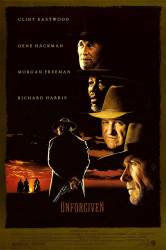Continuity mistake: In the final shoot-out scene where Clint Eastwood kills 5 men in rapid succession, Clint crouches and exchanges gunfire with two deputies who are standing side-by-side. A blood stain suddenly appears on the abdomen of the younger deputy on the left, but there is no bullet hole, it does not coincide with any gunshot sound effect, and the deputy does not react to the wound. A moment later, as Clint continues firing, both deputies topple over backwards.
Revealing mistake: In the jail scene, Gene Hackman is reading from a book. When he turns the book too far towards the camera you catch a glimpse of his lines on brighter white paper attached inside the book.
Factual error: During the confrontation between Little Bill and English Bob outside the barber shop, all the Deputies cocked their guns - for emphasis. Then Mr. Beauchamp reaches into his bag to show that he only has books, the Deputies cock their guns again. With the rifles they have this would eject the shell that was in the barrel and cycle a new one. It doesn't.
Continuity mistake: In the bar scene where Gene Hackman confronts Clint Eastwood there is a whiskey bottle and a glass on the table in front of Eastwood. He shoves the glass forward and you definitely hear it chink against the bottle. In the next second there are several inches of space between the bottle and the glass.
Factual error: When the dead cowboy is brought into town and Little Bill is getting briefed, one of his deputies remarks that "Witherspoon" will not sell them any more 30-30 shells unless they pay. The movie takes place in 1881, but the 30-30 cartridge wasn't developed until circa 1895. (01:36:45)
Continuity mistake: When "The Schofield Kid" kills "Quick Mike" in the outhouse, all of the shots are to the chest. In the cutaway shot of the dead Quick Mike, he has a bullet hole in his forehead.
Revealing mistake: English Bob is shooting the pheasants from the train. The first one he hits falls out the sky in front of the camera and you can see a wire attached to the bird trailing off camera to the right of the screen. (Slow-mo helps but is not necessary).
Character mistake: When Eastwood is trying to mount the horse for the first time he is pulling on the inside rein, which makes the horse turn away from him. Even a child of that time would know to pull on the outside rein to make the horse turn into you.
Factual error: English Bob is shooting the pheasants from the train. The film is supposed to be set in 1881. Ring neck pheasants are not native to the US. They were imported from Shanghai, China and not stocked east of the Rockies until 1898.
Plot hole: Guns were prohibited in the town of Big Whiskey. But in the final scene, Little Bill tells the Greeley's patrons to take out their guns and shoot Will Munny once Munny fires the last round in his rifle. A patron is even seen holding a gun after Munny shoots Little Bill and three of the deputies. According to the town ordinance, only Little Bill and the Sheriff Deputies would have had guns in that saloon, and they would not have had to be told. (01:57:00)
Factual error: The tension rod in Ned's house is plastic - wrong for the time.
Revealing mistake: After Muney kills Hackman's character and he is leaving town in the torrential downpour, a large circle of white light is illuminating the street in between the buildings. This light cannot possibly be from any natural or earthly source (e.g., it's raining heavily, so no moon; no electricity during this period in history). Without the artificial light, the scene would be completely dark and unviewable.
Other mistake: After the assassination in the outside toilet, as Clint and the kid are riding away they are very close together and being shot at by the other cowboys. The scene ends with the focus on two of the cowboys standing side by side but shooting in directions about 90 degrees apart. At the range they were shooting the targets would have to be 50 metres apart, but were actually last seen side by side.
Continuity mistake: After getting beaten by Little Bill, English Bob doesn't have much blood on his face. The next shot of him after Bill, the blood has changed pattern and there is a greater amount. (00:45:23)






Chosen answer: I think Little Bill takes offense to this sort of thing taking place in his town on his watch. He tells Mr. Beauchamp while he is writing his biography something like, "I do not like assassins, or men of low character."